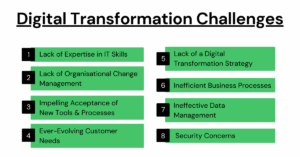Several government agencies and public sectors have undergone substantial digital progress in the past couple of decades.
According to Deloitte, 96% of respondents said digital technologies are highly improving the government sector.
The initial e-government exertions to the user experience encouraged the establishment of government digital service units and accepting organisational IT practices.
When they evolved, government agencies became connected but not transformed.
Many are still more attentive towards digitising front-end services only. They are moving slowly when it comes to the complex issues of fundamentally transforming essential government functions, procedures, and system structure.
In this post, we dig deep into the government-industry and public sector to explore how it is challenging for them to transform digitally. So let’s get going.
Digital Transformation – A Brief Intro
It is a constant process of improvement and incorporation of modern technologies. It enables organisations to transform their daily operations and services by replacing old school systems and manual processes.
It is significant for businesses to take an extensive view of their IT grounds. In many contexts, existing IT infrastructure can be leveraged more effectively. Processes can be improved which leads to better efficiency and advancement.
For many organisations, digital transformation is essential to survive in the ever-evolving market for the long term. As time passes, organisations are turning out to be more data-rich and connected.
Additionally, when you transform digitally, you will have
|
Digital Transformation Challenges

|1. Lack of Expertise in IT Skills
For each successful implementation of a digital transformation strategy, there is a dedicated and highly-skilled team of IT experts. Building this team is pretty challenging. As an increased number of organisations follow new technologies, a shortage of IT professionals is booming.
The deficiency of essential skills is one of the reasons government agencies hold back from aching their digital transformation objectives.
Specifically, they lack expertise in,
|
So hire outside experts from a custom software development company to supplement your in-house team.
|2. Lack of Organisational Change Management
Traditional business structures, incompetent workflows, and stiff leadership methods can prevent digital transformation success.
It was never more obvious than in 2020 when businesses make all the efforts to rapidly transform to a remote business model.
Businesses with a comprehensive change management approach are more likely to address digital transformation goals. Having a robust change management culture is significant for any business’s success.
A productive change management approach includes project planning by discovering the key factors that cause issues and developing relationships with all partners and the workforce.
|3. Impelling Acceptance of New Tools & Processes
New technologies and processes usually drive difficulties in the context of resistance to change. Tenured employees think there are no problems with the way they are currently performing everything.
To implement new software, businesses must offer all-inclusive on-boarding training and constant employee performance support.
It aids employees to be more productive and adept with a tool rapidly, letting them acknowledge the worth of these advanced processes.
|4. Ever-Evolving Customer Needs
The needs of customers are changing as technology evolves.
Digital transformation is not as easy as ABC. Comprehensive efforts can take years to achieve a goal. But during that time, the demand of your customers changes. Customer problems will grow.
So be agile while adopting new digital technologies.
Rather than assuming your customer needs, perform market analysis.
|5. Lack of a Digital Transformation Strategy
|
Ask all these questions before digital transformation implementation. There should be a predetermined strategy for a successful transformation.
Determine what areas of your business get improved and need an upgrade.
|6. Inefficient Business Processes
Do your existing business processes indicate the expected growth your business wants to accomplish?
Is your existing workflow can help you achieve your long-term business objectives?
If the answer is NO, you may need to change roadmaps and organisational rules and use data in different ways compared to what you initially imagined while implementing your traditional systems. It is called business process reengineering.
|7. Ineffective Data Management
Customer data is one of the essential things when you want to transform business digitally. It helps you gain insights into your customer’s preferences, behaviours, and future decisions.
So the way you get and manage this data matters.
If you are still using divided systems, it can be challenging to merge this data and access it centrally. So it is significant to link everything.
|8. Security Concerns
The majority of digital transformation efforts comprise the integration of all the data into one centralised system.
It increases the chances of cyberattacks that hack customers’ sensitive data and company’s confidential information.
Online attacks target
|
Make sure you have a plan to effectively decrease these threats in advance.
How do businesses overcome these challenges?
Here are five strategies organisations can implement to overcome the challenges.
|
In a Nutshell
Digital transformation is not the process of one-shot deals and then never look-backs, but it is a commitment to continuity that never ends.
Selecting the right technology partner that can lead you through technical evolution and counsel you on the best way to revolutionise your organisation can deliver many advantages.
If you are looking for the right technologies to digitally modernise your organisational processes, ask our experts. We are a custom software development company helping global clientele to digitally transform their businesses seamlessly.
